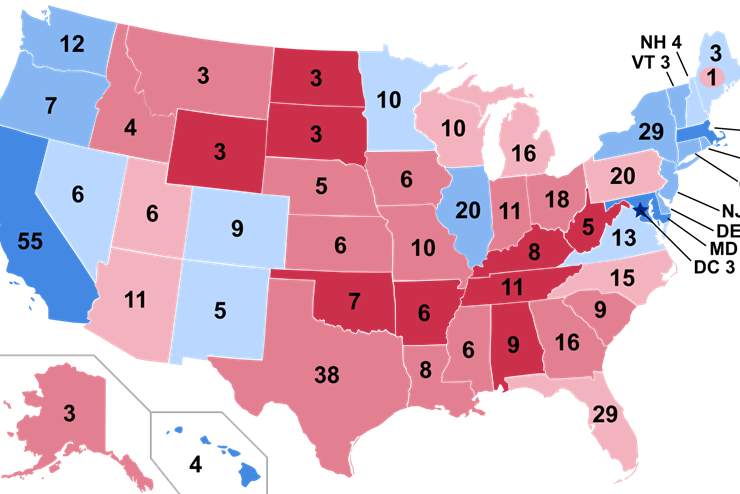The latest poll by Democracy Institute (DI), a nonpartisan polling firm that accurately predicted Brexit and the 2016 U.S. election, shows President Donald Trump pulling ahead of Joe Biden and winning the Electoral College with 319 votes.
The DI poll found that Trump leads Biden by 3 percentage points on the national stage, 48 to 45. In swing states, namely Florida, Iowa, Michigan, Minnesota, Pennsylvania, and Wisconsin, Trump has an average lead of 7 percentage points, 49 to 42. In Florida, Trump leads Biden by 3 percentage points (47 to 44), while he is ahead of Biden by 4 points (47 to 43) in New Hampshire. Likewise, in Minnesota—whose largest city, Minneapolis, is where the George Floyd incident took place—Trump is up by 4 points.
The DI polling comes in stark contrast to a slew of other polling data released in conjunction with mainstream media which shows Biden holding a substantial lead over Trump.
The DI poll has Trump winning 53 percent of white voters, 19 percent of black voters, and 39 percent of Hispanic voters. Moreover, 82 percent of Trump’s supporters are enthusiastic about backing their candidate, while only 40 percent of Biden’s supporters say the same.
The recent poll was calculated through a likely voter screen and with a D+2 partisan weighting (which means polled Democrats outnumber Republicans by 2 percent).
“Trump being up by a couple of points nationally isn’t so crazy,” Patrick Basham, DI’s founding director, explained to me during his appearance on the Cotto/Gottfried podcast. He said that Trump is 3 points ahead of Biden in DI’s national poll, which has a margin of error of 2.5 points, putting him just outside of the margin of error.
Basham said there are factors working to depress Democratic votes. The fact that large University campuses will be closed in November is most significant. The University environment, Basham elaborated, plays a major role in turning out young voters who tend to vote Democrat. This is one likely reason that DI’s data shows Democrat votes down nationally. For this reason, Basham says no one should be surprised if Trump “more than holds his own.”
I asked Basham about the enthusiasm gap, which he said is “very important,” as evidenced by the fact that every candidate who has trailed in supporter enthusiasm has lost since 2004. He explained that Trump’s “vote tally is lower than his approval tally.” This means that many polled voters approve of Trump but are not yet committed to voting for him. “That means he has room to grow,” according to Basham. This is real news, but it will receive minimal coverage.
You will not likely hear how well Trump is doing with black voters, either. Even establishment pollsters Zogby and Rasmussen place Trump’s black support somewhere above 20 percent. One cannot count on the mainstream media for honest numbers.
YouGov, which partners in polls with CBS, shows Joe Biden racing ahead of Donald Trump with a 10-point lead nationwide. However, YouGov did not specify how many Democrats it polled in relation to Republicans. They published a 112-page analysis of the survey which never mentions partisan breakdown. Also, the survey consists of registered, as opposed to likely, voters. Many people register to vote but never actually vote. Therefore, a registered voter is not necessarily a likely voter.
What is more, it is true that Democrats outnumber Republicans in voter registration by four points nationally, but that does not justify dramatically over-sampling Democrats, which has become common. Consider, for instance, Ipsos (Reuters) which oversampled Democrats by 13 percent, Quinnipiac University by 10 percent, Shaw & Company Research/Anderson Robbins Research (Fox News) by 6 percent, Siena College (New York Times) by 9 percent, Hart Research (NBC/Wall Street Journal) by 12 percent, Marist College (PBS) by 7 percent, and—when it surveyed for The Economist—YouGov by 11 percent.
These polls get lots of media attention because they are commissioned by mainstream outlets. None of them, however, accurately predicted the outcome of the 2016 election.
Image Credit:
above: Results by state, shaded according to winning candidate’s percentage of the vote 2016 [Image by: Ali Zifan / CC BY-SA 4.0 via Wikimedia Commons, cropped and resized]



Leave a Reply